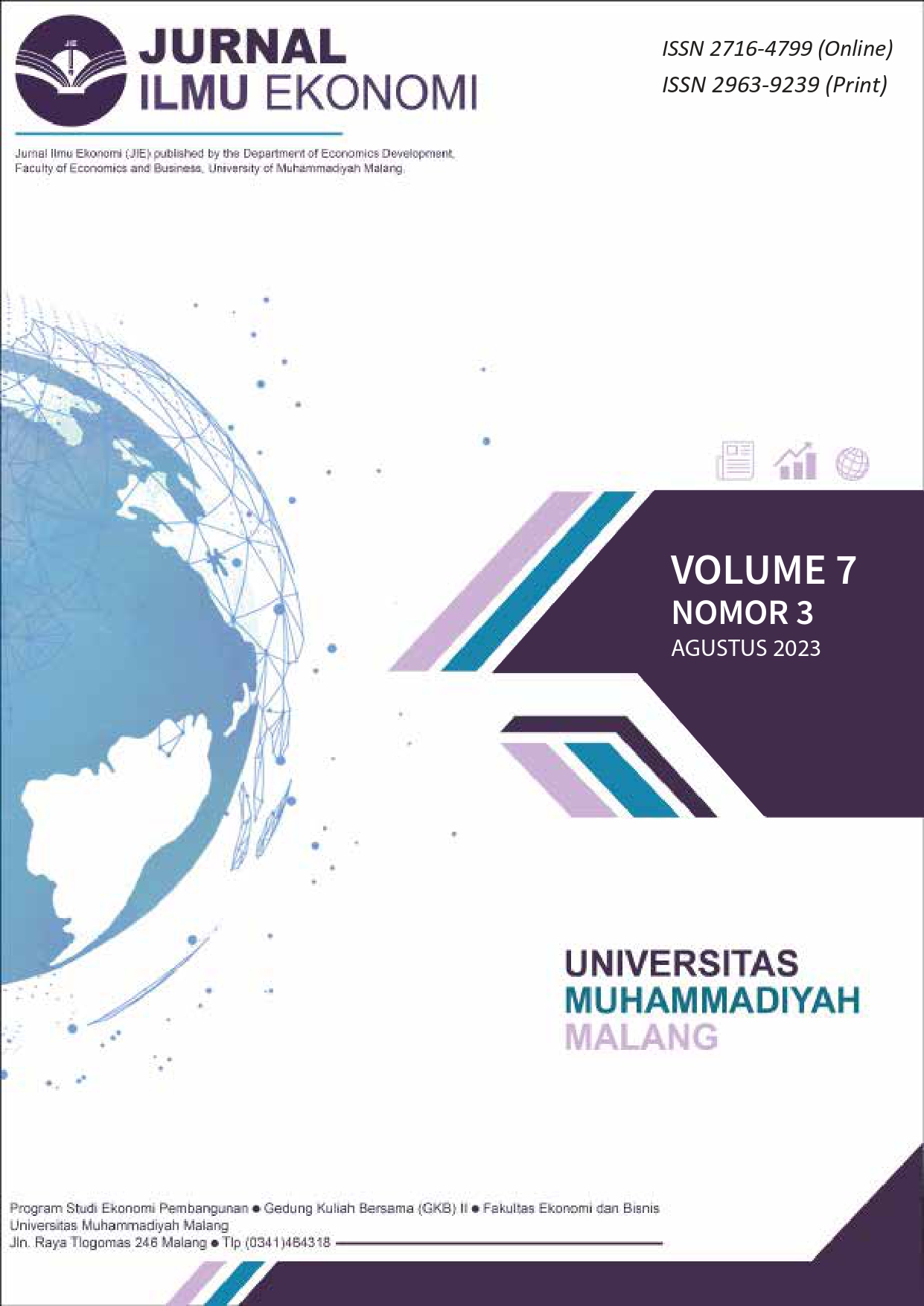Analisis Investasi dan Peran Teknologi Informasi Terhadap Pembangunan Ekonomi Inklusif di Jawa Timur
DOI:
https://doi.org/10.22219/jie.v7i03.27666Keywords:
Investment, Information Technology, Inclusive Economic DevelopmentAbstract
The purpose of this study is to determine the effect of investment and information technology on inclusive economic development in East Java. This research method is a quantitative research method by taking statistical data from BPS and Bappenas. Data collection used documentation techniques, namely collecting, recording and reviewing documents regarding data from the Central Statistics Agency and the National Development Planning Agency (Bappenas) for 2016-2021 which were taken directly from the BPS and Bappenas websites. Normality test, multiple linear regression analysis and regression coefficient significance test were performed as data analysis techniques. The results of the partial model test show that investment has a positive and significant effect on inclusive economic development. Meanwhile, information technology has a positive and significant effect on inclusive economic development. Simultaneous testing of the model shows that investment and information technology have a significant effect on inclusive economic development.
Tujuan dari penelitian ini adalah untuk mengetahui pengaruh investasi dan teknologi informasi terhadap pembangunan ekonomi inklusif di Jawa Timur. Metode penelitian ini adalah metode penelitian kuantitatif dengan pengambilan data statistik yang berasal dari BPS dan Bappenas. Pengambilan data menggunakan teknik dokumentasi yaitu mengumpulkan, mencatat dan mengkaji dokumen-dokumen tentang data Badan Pusat Statistik dan Badan Perencanaan Pembangunan Nasional (Bappenas) tahun 2016-2021 yang diambil secara langsung dari web BPS dan Bappenas. Uji Normalitas, Analisis regresi linier berganda dan uji signifikansi koefisien regresi dilakukan sebagai teknik analisis data. Hasil uji model parsial menunjukkan bahwa investasi berpengaruh positif dan signifkan terhadap pembangunan ekonomi inklusif. Sementara itu, teknologi informasi berpengaruh positif dan signifikan terhadap pembangunan ekonomi inklusif. Pengujian model secara simultan menunjukkan bahwa investasi dan teknologi informasi berpengaruh secara signifikan terhadap pembangunan ekonomi inklusif.
Downloads
References
Adeosun, O. A., Olomola, P. A., Adedokun, A., & Ayodele, O. S. (2020). Public investment and inclusive growth in Africa. International Journal of Social Economics, 47(12), 1669–1691. https://doi.org/10.1108/IJSE-05-2020-0333
Azwar. (2016). Pertumbuhan Inklusif di Provinsi Sulawesi Selatan dan Fakto-Faktor yang Memengaruhinya. Badan Pendidikan Dan Pelatihan Keuangan Kementrian Keuangan Republik Indonesia, 9(2), 1–31.
Bappenas. (2018). Indeks pembangunan inklusif. Jakarta: Kemeterian Perencanaan Pembangunan Nasional Republik Indonesia/Badan Perencanaan Pembangunan Nasional. IPEI. https://inklusif.bappenas.go.id/data
Chotimah R, A. O. (2022). Analisis Dampak Kebijakan Makroekonomi Terhadap Pertumbuhan Ekonomi Inklusif Provinsi di Pulau Sumatera tahun 2015-2020. Jurnal Kajian Ekonomi Dan Kebijakan Publik, 7(1), 92–106.
Hapsari, W. R. (2019). Analisis Pertumbuhan Ekonomi Inklusif Kabupaten/Kota di Provinsi Jawa Tengah. Jurnal Litbang Sukowati, 3(1), 106–116.
Hartati, Y. S. (2021). Analisis Pertumbuhan Ekonomi Inklusif di Indonesia. Jurnal Ekonomi Dan Bisnis, 12(1), 79–92. 10.55049/jeb.v12i1.74
Klasen, S. (2010). Measuring and Monitoring Inclusive Growth : Multiple Definitions, Open Questions, and Some Constructive Proposals.
Mobonggi I, Achmad N, R. (2022). Analisis Regresi Data Panel Dengan Pendekatan Common Effect Model Dan Fixed Effect Model Pada Kasus Produksi Tanaman Jagung. Jurnal Ilmiah Matematika, 2(2), 52–67.
Nchake, M. A., & Shuaibu, M. (2022). Investment in ICT infrastructure and inclusive growth in Africa. In Scientific African (Vol. 17). https://doi.org/10.1016/j.sciaf.2022.e01293
Oktavia, T. (2020). Analisis Pengaruh Teknologi Informasi dan Komunikasi (TIK) serta Pendidikan terhadap Pertumbuhan Ekonomi. Prosiding National Simposium & Conference Ahlimedia, 1(1), 139–146.
Prabandari, D. A. N., & Santoso, D. B. (2018). Analisis Inklusivitas Pertumbuhan Ekonomi di Jawa Timur dan Faktor-faktor yang Memengaruhinya. Jurnal Ilmiah Mahasiswa, 7(1), 1–10.
Ramadhani, N. (2020a). Analisis Pertumbuhan Ekonomi Inklusif Kabupaten/Kota di Jawa Timur tahun 2015-2019. Thesis. http://repository.um.ac.id/151262/
Ramadhani, N. (2020b). Analisis Pertumbuhan Ekonomi Inklusif Kabupaten/Kota di Jawa Timur tahun 2015-2019.
S, Dyah Hapsari Amalina; Hutagaol, M.Parulian; Asmara, A. (2013). Pertumbuhan Inklusif : Fenomena Pertumbuhan Inklusif di Kawasan Indonesia Bagian Barat dan Indonesia Bagian Timur. Jurnal Ekonomi Dan Kebijakan Pembangunan, 2(2), 85–112. 10.29244/jekp.2.2.85-112
Sholihah; D.H.A. (2014). Pertumbuhan Inklusif : Faktor-Faktor yang Memengaruhi dan Dampaknya terhadap Kelas Menengah di Indonesia. Jurnal Ekonommi Dan Kebijakan Pembangunan, 1–95.
Downloads
Published
How to Cite
Issue
Section
License
Copyright (c) 2023 Prawesti, R. P.

This work is licensed under a Creative Commons Attribution-NonCommercial-ShareAlike 4.0 International License.
Authors who publish with this journal agree to the following terms:
- For all articles published in the JIE (Jurnal Ilmu Ekonomi), copyright is retained by the authors. Authors give permission to the publisher to announce the work with conditions. When the manuscript is accepted for publication, the authors agree to the automatic transfer of non-exclusive publishing rights to the publisher.
- Authors retain copyright and grant the journal right of first publication with the work simultaneously licensed under a Creative Commons Attribution-NonCommercial-ShareAlike 4.0 International License that allows others to share the work with an acknowledgement of the work's authorship and initial publication in this journal.
- Authors are able to enter into separate, additional contractual arrangements for the non-exclusive distribution of the journal's published version of the work (e.g., post it to an institutional repository or publish it in a book), with an acknowledgement of its initial publication in this journal.
- Authors are permitted and encouraged to post their work online (e.g., in institutional repositories or on their website) prior to and during the submission process, as it can lead to productive exchanges, as well as earlier and greater citation of published work (See The Effect of Open Access).
This is an open access article and licensed under a Creative Commons Attribution-NonCommercial-ShareAlike 4.0 International License








